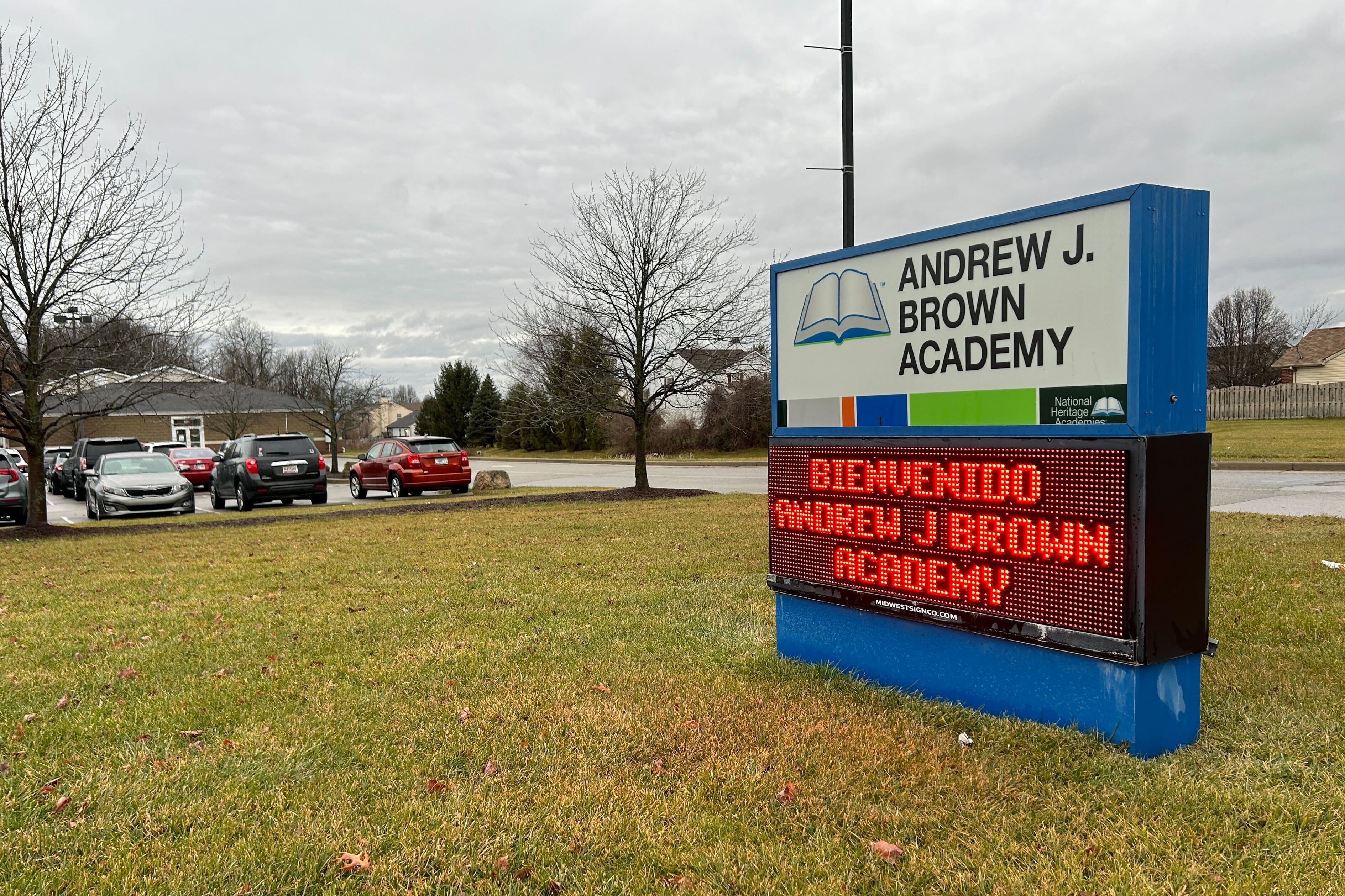Sign up for Chalkbeat Indiana’s free daily newsletter to keep up with Indianapolis Public Schools, Marion County’s township districts, and statewide education news.
One of the oldest charter schools in Indianapolis is severing ties with its national for-profit operator over concerns about transparency, high staff turnover, and a lack of local control.
Andrew J. Brown Academy’s school board is in the process of parting ways with National Heritage Academies, which has run the school on the far eastside since it opened in 2003, as its charter faces a renewal decision from the mayor’s Office of Education Innovation. Instead, the school hopes to partner with Paramount Schools of Excellence, a popular local nonprofit charter operator.
The school’s board hopes that the switch will increase their control over funding that they currently send to National Heritage Academies (NHA), a national organization not based in Indiana. But the transition also brings uncertainty for the future of the troubled K-8 school — named after a local civil rights leader — that serves about 600 students who are mostly Black or Hispanic.
In addition to lagging test scores, unstable leadership, and failures to meet special education requirements revealed by a state investigation, Andrew J. Brown has experienced a striking amount of staff turnover recently. Between the 2020-21 and 2021-22 school years, for example, roughly three-quarters of teachers left the school.
The mayor’s office has until April 1 to make a renewal decision — which officials say will depend on whether the school finds a new building and finalizes an agreement with a new operator. The school will likely have to move to a different location for next school year because its current building is owned by National Heritage Academies. The school pays NHA nearly $800,000 a year in rent, according to school board chair Richard Hailey.
Charter authorizers have the power to approve, shut down, or renew a charter school — decisions largely based on how the school performs and operates during the term of its charter. A charter school’s governing board, meanwhile, can designate and pay an operator to run the school.
“Even though Andrew J. Brown has had the backing of a national service provider with considerable financial resources for 20 years, the academic and operational systems we expect to see at a school of this age are quite frankly not present,” said Patrick McAlister, director of the Office of Education Innovation Director, at a renewal hearing for the school in December.
National Heritage Academies, which also operates Aspire Charter Academy in Gary and over 100 other schools in eight other states, argued that the school academically outperforms nearby schools.
“These and other metrics show that we have made good on our promise to provide educational opportunities to the families we serve,” a spokeswoman said in a statement. “So, it’s deeply disappointing the school board has decided not to renew their services agreement with us.”
The separation of the school and NHA means the departure of the last for-profit charter operator of brick-and-mortar schools in Indianapolis, home to a charter community that has placed significant emphasis on schools operated locally and in a non-profit manner.
Hailey said the school’s board feels that the for-profit model doesn’t work well for primary and secondary education.
“There’s a feeling that everything should be spent on students,” he said. “That there shouldn’t be a profit left over.”
School board hopes for better academic results, transparency
The school’s board ended its service agreement with NHA around a year ago, Hailey said. It has been operating on a temporary agreement that has required the operator to share more information with the school — while allowing the school to continue using the NHA-owned building, he said. But the agreement ends at the end of this school year, leaving the school on the hunt for a facility.
Andrew J. Brown and Paramount officials are hoping a new operator will address some of the myriad issues that occurred since the start of the pandemic.
When contacted by Chalkbeat, Paramount Schools CEO Tommy Reddicks referred comment to Andrew J. Brown’s school board until more details are finalized. But at last month’s hearing, Reddicks and school officials made the pitch to Office of Education Innovation officials for Paramount to run the school.
Paramount’s partnership with Andrew J. Brown would be a “confer and consent” model with the school’s board, Reddicks said. That model would offer transparency and oversight for the school board, he said.
The school’s teacher turnover rate has been remarkably high recently. For example, between the 2020-21 and 2021-22 school years, when 74% of teachers left Andrew J. Brown, Marion County schools as a whole retained roughly 66% of their teachers, according to the school’s renewal application and an analysis of state data from the Richard M. Fairbanks Foundation.
Then there’s test scores. While the school has rebounded from the pandemic to a certain extent, only 46.8% of its third graders passed the state’s IREAD test last year — a drop of roughly 16 percentage points from last year. That was the biggest decline of any of the schools in the mayor’s portfolio of charter schools, according to the Office of Education Innovation.
Leadership at the school was also unstable after it lost its principal at the end of 2020-21, according to the school’s renewal application. That left the authorizer uncertain about the building’s instructional leader until the current principal took the position in the fall of 2022, according to the Office of Education Innovation’s renewal report.
In March 2022, the Office of Education Innovation notified the school that it was failing to meet certain standards in its accountability plan and charter agreement, including legal obligations to students with limited English proficiency.
Two months later, the state found violations of state special education requirements, including a failure to ensure proper licensure for special education teachers and a failure to provide services outlined in students’ individualized education programs. The mayor’s office subsequently placed the school on probationary status. The state later closed the file on the school in December 2022 after the school took corrective action.
Budget transparency, too, has been a problem. NHA prepares a budget which the board must approve, Hailey said, but in the past it’s been unclear to the board how that money has been spent. The school board has historically signed off on monthly payments to NHA for the costs of running the school, he said.
“It’s a model that they run [for] a lot of schools, and they’re not open to negotiating how those schools are run,” Hailey said. “So as a board member there’s not a lot of transparency when it comes to budgets. You really don’t get the amount of information you need to conduct effective oversight.”
The school has sought a new operator that serves a similar demographic of students while delivering excellent results, Hailey said. “We don’t want just [to be] keeping up with the IPS schools,” Hailey said. “We want to excel.”
Hailey also said he hopes the school will stay on the northeast side, serving the same student population.
McAlister said it’s too early to say whether his office supports the idea of Paramount helping to run the school.
Paramount’s work has attracted positive attention. A higher percentage of Black and Hispanic students in Paramount-run schools passed both the math and English sections on the state ILEARN test than in IPS, according to the latest 2023 state data.
“We know that Paramount has a strong track record in Marion County, and have a high degree of confidence in their ability to manage a school,” he said.
Amelia Pak-Harvey covers Indianapolis and Lawrence Township schools for Chalkbeat Indiana. Contact Amelia at apak-harvey@chalkbeat.org.






